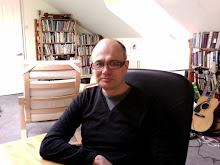Without wishing to get in to the details of the case, I was interested in the discussion on Today this morning. John Humphries (I think it was he - it was rather early on the day after a bank holiday!) was expressing surprise and shock that poets should be engaged in such 'worldly' practices. Poetry, he asserted, is supposed to lift us to a higher plane.
As one who uses poetry in worship, I found the debate fascinating. I use poetry for a number of reasons.
Certainly, poetry has the possibility of expressing sentiments which cannot be contained with prose. In this sense, it lifts us above the everyday and into the numinous realm of the other.
Certainly, poetry is much more open than prose. Prose seeks to define and label, where poetry floats and suggests. In this way, poetry can be far more radical than can poetry, expressing ideas which many may instinctively 'feel' without ever arousing the ire of the Daily Mail reading forces of reaction - for there is nothing concrete there to which they can take exception.
But does this mean that the poet exists in some 'higher plane,' immune from the realities of the real world?
One of the formative events in my university days was to attend a poetry reading by the Liverpool Poets, Roger McGough, Brian Patten and Adrian Henri. Their words soared, entertained and challenged the audience to a deeper understanding of early Thatcherite Britain. Which did not prevent me from observing that all three of them had consumed more alcohol before the performance than was wise. They continued to sup as they recited and by the end of the evening were in typically rowdy mood - degenerating into what can only be described as a fight!
Linton Kwesi Johnson's Sonny's Lettah from the same sort of era, or anything by John Cooper Clarke also spring to mind as examples of poetry firmly rooted, grounded in the world out of which they grew. More classically, one might point to WB Yeats, or the WWI poets - or even William Blake. All poets whose power comes, not from escaping from the real world, but in engaging with and seeking to transcend the reality of their contemporary situation. I would even suggest that William Wordsworth and the Romantic poets were not so much attempting to escape from contemporary reality as to re-attach an alienated, industrial society to its roots.
Too much modern worship is prosaic. The majority of modern worship songs are as 'dumbed down,' repetetive and unimaginative as a Stock Aitken & Waterman, Hit Factory pop record. Worship, if it is to reflect divinity, must strive for the poetic glories, whether they be Bob Dylan or Beethoven, Duffy or Shakespeare.






I think it is kerfuffle but I knew what you meant!
ReplyDeleteI heard the interview as well and shouted no at the radio as I was getting Niamh ready. She mistook my upset with poetry as a parental command! Poetry is supposed to gibve us a heightened awrenss of the reality of our world not extract us from it ... something similar could be said about worship.
ReplyDelete